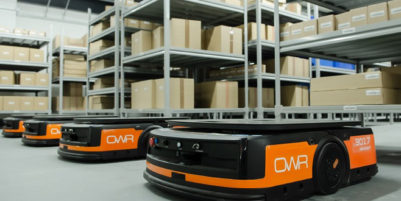-
Nutrivend selects Forterro’s Orderwise to support online expansion and streamline operations - April 11, 2025
-
ARROWXL LAUNCHES AMBITIOUS ZERO WASTE ROADMAP - April 8, 2025
-
THE BCMPA’S NEW CAMPAIGN DRIVES OUTSOURCING SUCCESS IN Q1 - April 7, 2025
-
BLACKOUT TECHNOLOGIES TARGETS TELEMATICS-INTEGRATED MOBILE DEVICE BLOCKING TO COMBAT SMARTPHONE DISTRACTION - April 1, 2025
-
OpenADR Alliance announces first OpenADR 3.0 certified products with EVoke Systems, E.ON Energy and Universal Devices - March 25, 2025
-
Growing fulfilment and contract packer appoints new Managing Director - March 25, 2025
-
When is it time to invest in a WMS? Understanding the key trigger points - March 25, 2025
-
eCapital helps Vantage Recruitment on its journey to financial success - March 24, 2025
-
Hugo Beck Celebrates 70 Years of Packaging Innovation with Open House Events - March 20, 2025
-
PROLOG FULFILMENT SUPPORTS LUNA DAILY’S COMMITMENT TO BETTER BODY CARE FOR ALL WOMEN - March 19, 2025
One thing the Coronavirus pandemic has permanently changed is our attitudes towards consumption and healthy eating. In the last lockdown, data was released by Accenture showing that 60% of consumers were reporting making more environmentally friendly, sustainable, or ethical purchases since the start of the pandemic. Nine out of 10 of that percentage also said they were likely to continue doing so in the future. These trends set the scene for a particularly solid foundation for Veganuary this winter too.
Held each January, Veganuary becomes bigger each year, as veganism itself is no longer a niche market segment either. In 2021 a record 500,000 people pledged to eat only vegan food in January. Plant based food and drink products are attracting mainstream palates and small, artisanal food producers with clear visions are being snapped up by larger manufacturers looking for the next big thing.
Meat alternatives have become especially popular as an investment. The global meat substitutes sector is currently worth $20.7 billion and set to grow to $23.2 billion by 2024, according to market research company Euromonitor. This growth is being spurred by concerns ranging from animal welfare to food security and provenance. Experts in the food industry agree that traceability and allergen control are critical to get right. Should any of the plant-based meat companies experience an industrial quality accident, or problem with their recipes that results in a recall, it could make customers wary about eating the products in future.
Quality management, traceability and allergen control
In the food manufacturing industry, having full stock traceability – the ability to manage which stocks are selected for a production run and the ability to trace an item from the moment it arrives onsite to its final dispatch as a finished product – are now more important than ever. Many of these new, plant-based meat alternatives contain allergens – nuts, seeds, pulses, wheat and soya predominantly – which must be labelled correctly and potentially stored away from other raw materials to avoid contamination.
Benefits of a WMS for plant-based food manufacturers
This is where implementing a Warehouse Management System (WMS) and integrating it with an existing ERP system to power real time decision making comes into its own. A WMS gives plant-based food manufacturers the ability to trace every product made together with its constituent ingredients right through the warehouse and beyond to the customer.
A WMS provides manufacturers with complete control of all stock coming into the warehouse, being moved around the 4 walls and into production and then control of finished products as they leave the warehouse. This can be done at the single item, case or pallet level. Particularly important for allergen control, is the ability to select raw materials and stock with special characteristics to meet specific requirements and the ability to trace when a specific batch of stock has been issued and to which dispatching point. If necessary, stock batches can be quarantined and investigated for contamination, with a complete audit trail for compliance reporting.
Just as important as traceability management is stock rotation. Many plant-based foods have limited shelf lives and using a WMS, it’s easy to track stock according to production, best before, expiry or inbound receipting dates. Operating First-In, First-Out (FIFO) stock rotation for efficient shelf life management becomes a routine procedure – for raw materials as well as packaging, thereby reducing levels of waste. Finally, a WMS supports real time reporting of outbound customer deliveries, ensuring full stock traceability through the supply chain and simplifying product recalls in the event of a QA issue.
Clearly there’s huge scope for marketing new plant food concepts to adventurous vegans, vegetarians and flexitarians. With these commercial opportunities comes a requirement to tightly manage traceability and allergen control – especially the capability to trace ingredients back to their original sources and isolate particular product batches to the time of manufacture.
Any plant-based food manufacturers implementing WMS warehouse management software can expect to recoup their investment many times over in a short space of time.
Author
Eric Carter, Solutions Architect at Indigo Software

































